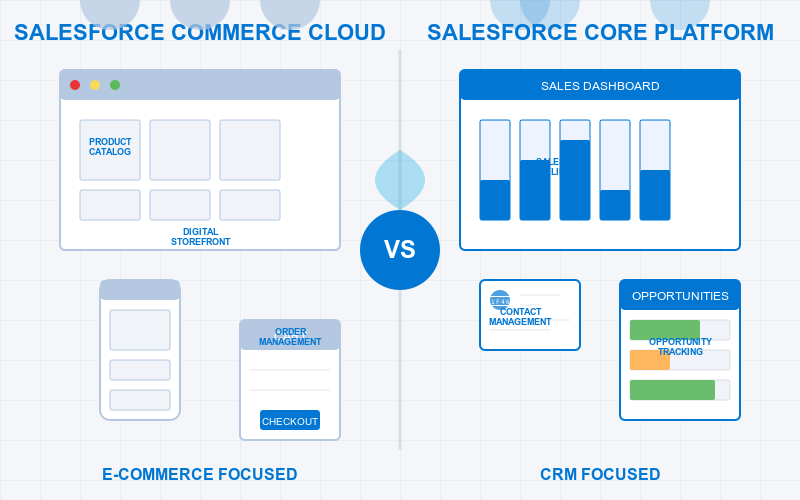
Salesforce is a global leader in cloud-based solutions, providing businesses with innovative tools to streamline operations, enhance customer relationships, and boost sales. Two of its widely used products, Salesforce Commerce Cloud and Salesforce (CRM), serve different but complementary purposes. While both belong to the Salesforce ecosystem, their functionalities, use cases, and benefits vary significantly.
In this article, we’ll compare Salesforce Commerce Cloud vs. Salesforce CRM, highlighting their features, differences, and how businesses can leverage them for growth.
What is Salesforce Commerce Cloud?
Salesforce Commerce Cloud (SFCC) is a cloud-based eCommerce platform designed to help businesses create seamless digital shopping experiences. It provides businesses with the tools to manage their online stores efficiently, optimize customer experiences, and drive revenue growth.
Key Features of Salesforce Commerce Cloud
-
Unified Commerce – Enables businesses to manage both online and offline sales channels from a single platform.
-
AI-Powered Personalization – Uses Salesforce Einstein AI to deliver personalized shopping experiences.
-
Scalability – Supports businesses of all sizes, from startups to enterprises.
-
Mobile-First Approach – Ensures that eCommerce stores are optimized for mobile users.
-
Multi-Channel Integration – Seamlessly integrates with social media, marketplaces, and physical stores.
-
Marketing and Merchandising Tools – Helps in campaign management, promotions, and dynamic pricing.
What is Salesforce (CRM)?
Salesforce CRM is the customer relationship management (CRM) software that helps businesses manage interactions with prospects, customers, and partners. It provides a 360-degree view of customer data, enabling sales, marketing, and support teams to collaborate effectively.
Key Features of Salesforce CRM
-
Lead and Opportunity Management – Tracks sales leads and prospects efficiently.
-
Customer Data Management – Provides a complete customer profile with interactions, history, and preferences.
-
Automation Tools – Includes workflow automation, AI-driven insights, and sales forecasting.
-
Integration Capabilities – Connects with third-party applications, including marketing automation tools.
-
Analytics and Reporting – Offers real-time insights and dashboards to make data-driven decisions.
-
Omnichannel Support – Ensures seamless communication across email, chat, social media, and phone.
Key Differences Between Salesforce Commerce Cloud and Salesforce CRM
While both platforms belong to Salesforce’s ecosystem, they cater to different aspects of business operations. Here’s a detailed comparison:
| Feature | Salesforce Commerce Cloud | Salesforce CRM |
|---|---|---|
| Purpose | eCommerce & online sales | Customer relationship management |
| Primary Users | Retailers, B2B & B2C eCommerce businesses | Sales, marketing, and support teams |
| AI Capabilities | Einstein AI for personalized shopping | AI-driven sales insights and automation |
| Multi-Channel Support | Web, mobile, social commerce | Email, phone, chat, social media |
| Core Functions | Digital storefront, merchandising, order management | Sales tracking, customer interactions, automation |
| Customization | Highly customizable storefronts | Custom workflows, reports, and automation |
| Integration | Payment gateways, ERP systems | Marketing tools, service management, business intelligence |
Salesforce Commerce Cloud vs. Salesforce CRM: Which One Do You Need?
Choosing between Salesforce Commerce Cloud and Salesforce CRM depends on your business needs.
-
If you are running an online store, need advanced eCommerce management tools, and want to improve your digital customer experience, then Salesforce Commerce Cloud is the ideal solution.
-
If your goal is to manage customer relationships, streamline sales processes, and enhance customer engagement, then Salesforce CRM is the right choice.
-
For businesses that sell online and require a CRM system, integrating both Salesforce Commerce Cloud and Salesforce CRM can create a comprehensive customer experience strategy.
Benefits of Integrating Salesforce Commerce Cloud with Salesforce CRM
For businesses looking to maximize efficiency, integrating Salesforce Commerce Cloud and Salesforce CRM can be a game-changer.
1. Enhanced Customer Experience
Integrating both platforms enables businesses to provide personalized recommendations, seamless order history tracking, and real-time customer insights, leading to higher customer satisfaction.
2. Streamlined Sales & Marketing Efforts
By combining eCommerce data with CRM insights, marketing and sales teams can run more effective campaigns, leading to higher conversion rates.
3. Better Data Analytics & Reporting
Salesforce’s robust analytics tools allow businesses to track both sales performance and customer behavior, helping in data-driven decision-making.
4. Increased Revenue Growth
With AI-driven personalization, automation, and targeted marketing, businesses can optimize their sales funnels and drive higher revenue.
Conclusion
Both Salesforce Commerce Cloud and Salesforce CRM are powerful tools, but they serve different purposes.
-
Salesforce Commerce Cloud is ideal for businesses that need a robust eCommerce solution.
-
Salesforce CRM is perfect for companies that focus on customer relationships, sales tracking, and automation.
-
When integrated, these platforms can provide a holistic business solution that enhances customer engagement and drives business growth.
Final Thought
Whether you choose Salesforce Commerce Cloud, Salesforce CRM, or both, your decision should align with your business goals and strategy. By leveraging Salesforce’s ecosystem, companies can optimize operations, increase customer retention, and stay ahead in today’s competitive digital landscape.




Leave a Reply